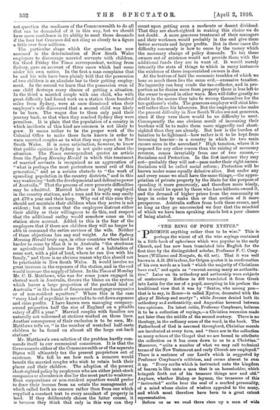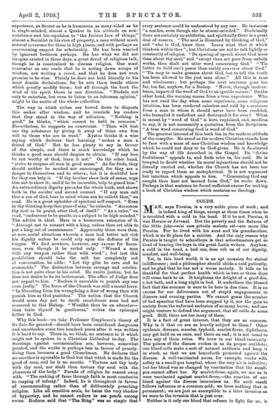"THE RING OF POPE XYSTUS."
"pROMISE anything rather than to be wise." This is perhaps the wisest of all the wise sayings contained in a little book of aphorisms which -was popular in the early Church, and has now been translated into English for the first time by the distinguished scholar, Professor F. C. Cony- beare (Williams and Norgate, 4s. 6d. net). That it was well known in A.D. 250 is clear, for Origen quotes it in confirmation of his own words as a book "which the majority of Christians have read," and again as "current among many as authorita- tive." Later on its orthodoxy and authorship were subjects of controversy. Rufinus in 400 translated it from Greek into Latin for the use of a pupil, accepting in his preface the traditional view that it was by " Sextus, who among you— that is to say, in Rome—is called Xystus, decorated with the glory of Bishop and martyr"; while Jerome denied both its orthodoxy and authenticity, and Augustine hovered between two opinions. Its latest critic, Professor Conybeare, believes it to be a collection of sayings,—a Christian recension made not later than the middle of the second century. There is no theology, in the ordinary sense of the word, in the book. The Fatherhood of God is assumed throughout., Christian morals are inculcated at every turn, and "there are in the collection so many echoes of the Gospel that we are bound to attribute the collection as it has come down to us to a Christian." Moreover, "quite a number of what we may call technical terms of the New Testament and early Church are employed." There is a sentence of our Lord's which is suggested by Professor Conybeare's criticism, and seems almost to sum it up. "Every scribe which is instructed unto the kingdom of heaven is like unto a man that is an householder, which bringeth forth out of his treasure things new and old." Anyhow, whether Bishop or layman, the treasures of this "instructed" scribe bear the seal of a marked personality, of a mind whose choice of wisdom appealed to the many, and which must therefore have been to a great extent representative.
Before us as we read there rises up a man of wide
experience, as devout as he is humorous, as many-sided as he is single-minded, almost a Quaker in his attitude on non- resistance and his repulsion to "the furious face of things," almost a Socialist in his view of property, a man without much natural reverence for those in high places, and with perhaps an overweening respect for scholarship. He has been wearied by ignorant brethren perhaps. He has what we did not imagine existed in those days, a great dread of religious talk, though he is constrained to discuss religion. One must remember as one reads that he is noting down scraps of wisdom, not writing a creed, and that he does not even promise to be wise. Plainly he does not hold literally to his most drastic declarations, for he sets them beside others which greatly modify them ; but all through the book the wind of his spirit blows in one direction. "Disdain not only to entertain, but even to listen to an inhuman opinion," might be the motto of the whole collection.
The way in which riches are bowed down to disgusts this seeker after wisdom, and he reminds his readers that they stand in the way of salvation. "Nothing is good," he thinks, "which cannot be held in common." Nevertheless, be suggests no constraint. "Thou wilt best use thy substance by giving it away of thine own free will to those who are in want." Xystus thinks it a wise saying which declares that learning "makes a man a friend of God." But he has plenty to say in favour of the simple, and there is much knowledge which he thinks a good man should despise to obtain. "If any lore be not worthy of God, learn it not." On the other hand, "strive to surpass all men in good sense." As for fools, they should neither be mocked nor encouraged, for they are a danger to themselves and to others ; but it is doubtful how far they can help it. "If thy brother show lack of sense, urge him not to show it;; and if he be incurable, help to guard him." An extraordinary dignity pervades the whole book, and shows both in the secular and sacred counsel. "If any man call thee a son of God, bear in mind whose son he calleth thee," we read. He is a great upholder of spiritual self-respect. "Even in thy thinking keep thee pure of sins," he exhorts. "Accustom thy soul to be proud, after God, of itself." "As a ruler," we read, "endeavour to be gentle, as a subject to be high-minded." The advice is ideal. Here is a humorous extension of it. "Attempt; not to consort with a king, unless thou art able to put a king out of countenance." Apparently there were then, as now, social situations wherein a man had better not risk his dignity unless he could rely upon the defence of his tongue. We find nowhere, however, any excuse for fierce- ness, even though it be verbal only. "Wound a man with any weapon rather than with word"; but lest this prohibition should take the salt too completely out of conversation, he adds: "Let thy gibe be rare and be seasonable." The distinction between revenge and retribu- tion is not quite clear in his mind. He exalts justice, but he does not desire to be its instrument. The office of Judge does not appeal to him. "Reckon it execrable to punish any one even justly." The force of the Church was still a moral force. "In liberating from his wrongdoing a doer of wrong thou wilt punish him as God punishes." The notion that the Church would some day put to death recalcitrant sons had not occurred to this Bishop. " Wouldst thou be an educator—. then train thyself in gentleness," writes the episcopal father in God.
Why this book—we take Professor Conybeare's theory of its date for granted—should have been considered dangerous and unorthodox some two hundred years after it was written it is hard to say. There is, we think, no sentence in it which might not be spoken in a Christian Cathedral to-day. The warnings against ceremonialism are, however, somewhat pointed, and the scribe is perhaps less in favour of prosely- tising than becomes a good Churchman. He declares that no sacrifice is agreeable to God but that which is made for the good of man, and he is no ascetic. "Torture not thy body with thy soul, nor shalt thou torture thy soul with the pleasures of the body." Parade of religion he cannot away with. "The seeking of fame through faith is most conducive to reaping of infamy." Indeed, he is throughout in favour of recommending rather than of deliberately preaching religion. Like all sensitive souls, he hates the very shadow of hypocrisy, and he cannot endure to see pearls among swine. Rennie said that "The Ring" was so simple that every sentence could be understood by any one. He instances "a maiden, even though she be absent-minded." Doctrinally there are certainly no subtleties, and spiritually there is a great deal of reserve. "The soul is illumined by thinking of God," and "who is God, know thou. Learn what that is which thinketi within thee "; but Christians are not to talk lightly or constantly of religion. "Be sparing of speech about God more than about thy soul," and "except thou art pure from unholy works, thou shalt not utter word concerning God." " 'Tis better to hold one's peace than rashly converse about God." " 'Tis easy to make guesses about God, but to tell the truth has been allowed to the just man alone." All this is true and wholesome; but perhaps the next sentence goes too far, too far, anyhow, for a Bishop. "Never, through inadver- tence, impart of the word of God to an ignoble nature." On the other hand, the warning comes from a true experience. Who has not rued the day when some experience, some religious intuition, has been rendered valueless and void by a sentence from a man to whom it should never have been confided, who trampled it underfoot and destroyed it for ever ? What is meant by "word of God" is here explained, and, needless to say, it is not necessarily a quotation from the Scriptures. "A true word concerning God is word of God."
The greatest interest of this book lies in the modern attitude of the compiler. He stood as the modern Christian stands, face to face with a mass of non-Christian wisdom and knowledge which he could not deny to be God-given. He is fascinated by the way of life described in the Gospel. Its "divine foolishness" appeals to, and finds echo in, his soul. He is tempted to doubt whether its moral injunctions should not be literally carried out, whether the Church has not been too ready to regard them as metaphorical. It is not argument but intuition which appeals to him. "Concerning God say naught thou haat not learned from God," he wrote down. Perhaps in that sentence he found sufficient excuse for making a book of Christian wisdom which contains no theology.











































 Previous page
Previous page